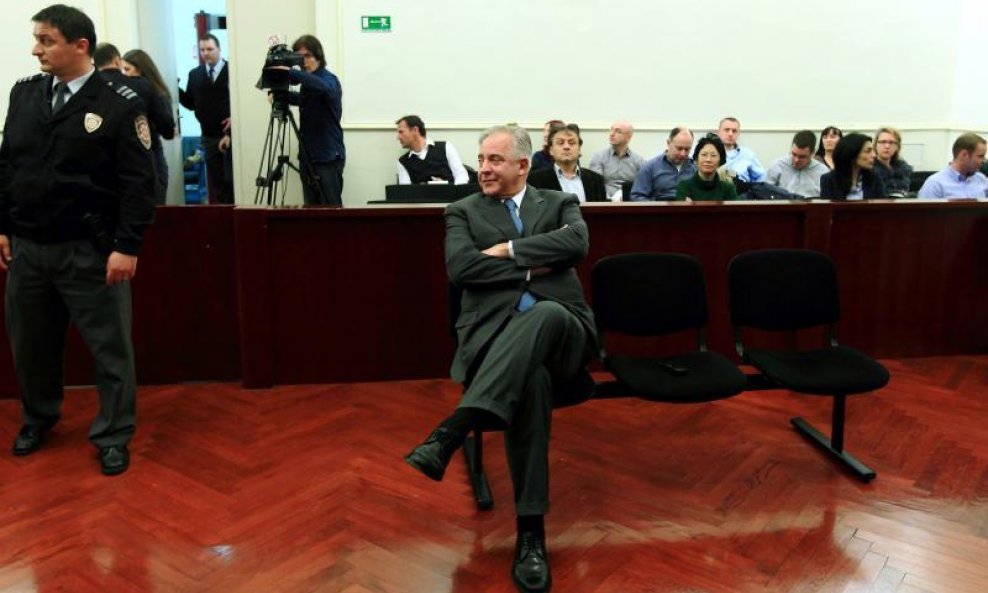Former Prime Minister Ivo Sanader betrayed Croatian national interests by helping the Hungarian oil company MOL assume a dominant position in Croatia's INA and divest INA's loss-making gas business, acquiring illegal gain for himself using his position as Prime Minister, Judge Ivan Turudic said in an explanation of the guilty verdict against Sanader in the INA-MOL case on Tuesday.
"The court finds that the amended shareholders' agreements between MOL and INA were contrary to the interests of the Republic of Croatia," Turudic said, adding that the bribe that Sanader had received was what made this a criminal case and not just a bad political decision.
"If no bribe had been involved, the transfer of controlling rights and the business divestiture would have been regarded as one in a series of catastrophic political decisions the punishment for which would have been the loss of elections. But it is the bribe in this case that distinguishes a bad decision from the crime of which you are found guilty," the judge added.
Turudic described Sanader as the architect of a system in which decisions were made to suit his personal desires, which he said was just a semblance of a democratic process. He said that the government that approved the amended shareholders' agreement with MOL was "an ideal medium" that accepted Sanader's orders and wishes without question or discussion.
"As prime minister-elect, you proposed all Cabinet nominees to Parliament where your party had a majority. You selected them according to your own criteria. Events have shown that the basic criterion was obedience and they obeyed you blindly," the judge said, recalling witness testimonies confirming that all decisions were adopted unanimously in accordance with Sanader's views.
Unlike the defence, the trial chamber took the view that the Sanader government did not have to amend the shareholders' agreement because the basic agreement of 2003 said that it needed to be amended only if one of the parties acquired more than 50% of the shares and not if it fell below that level.
MOL aspired to acquire as many shares as possible, which is quite legitimate, but it should not have attained that goal unlawfully, that is through bribery, the judge concluded.
After the amendment of the shareholders' agreement, INA got new supervisory and management boards in which the Hungarian CEO had a "golden vote", and a new body was established, a board of executive directors, which denied the Croatian members of the management board access to some vital information, although it was meant to be an advisory body to the management board.
"The system of decision making was such that particular decisions were first sent to Budapest, which means that INA was reduced to MOL's subsidiary," Turudic said.
"The Croatian members of the management board asked for permission to attend meetings of the board of executive directors, but were refused because their presence would have distracted and disturbed the executive directors. The management board's advisory body gave itself the right to prevent management board members from controlling persons under them," the judge said.
"The aim was to make it possible for MOL to acquire 100% control, which you yourself confirmed by saying that INA should better be run by competent Hungarian managers than bad Croatian ones," the judge told Sanader.
Turudic said that the divestiture of the gas business from INA was also against national interests, noting that in fact only gas trade was divested, while gas production and transport remained under INA's authority.
"Gas sales made losses, so this activity was divested and all losses were borne by the state. The fact that even now Croatia covers 100% of the gas trade costs instead of 44%, which is its share in INA, shows that this is contrary to Croatia's interests," Turudic said, stressing that this was also the result of Sanader's earlier deal with MOL CEO Zsolt Hernadi.
The trial chamber fully accepted the testimony of prosecution witness Robert Jezic, former owner of the Dioki petrochemical company which, as successor to Jezic's Swiss-based firm Xenoplast, was ordered to pay into the state budget 5 million euros of the bribe intended for Sanader.
Jezic's statement was partly confirmed by defence witness Imre Fazekas who testified together with Russian oil magnate Mikhail Gutseriev that the money in the account of Jezic's firm was theirs and was not intended for Sanader. The court did not believe their allegations, while Jezic described everything in detail, Turudic said.
The court dismissed Sanader's claim that Jezic had bought himself freedom by giving false testimony against him.

































